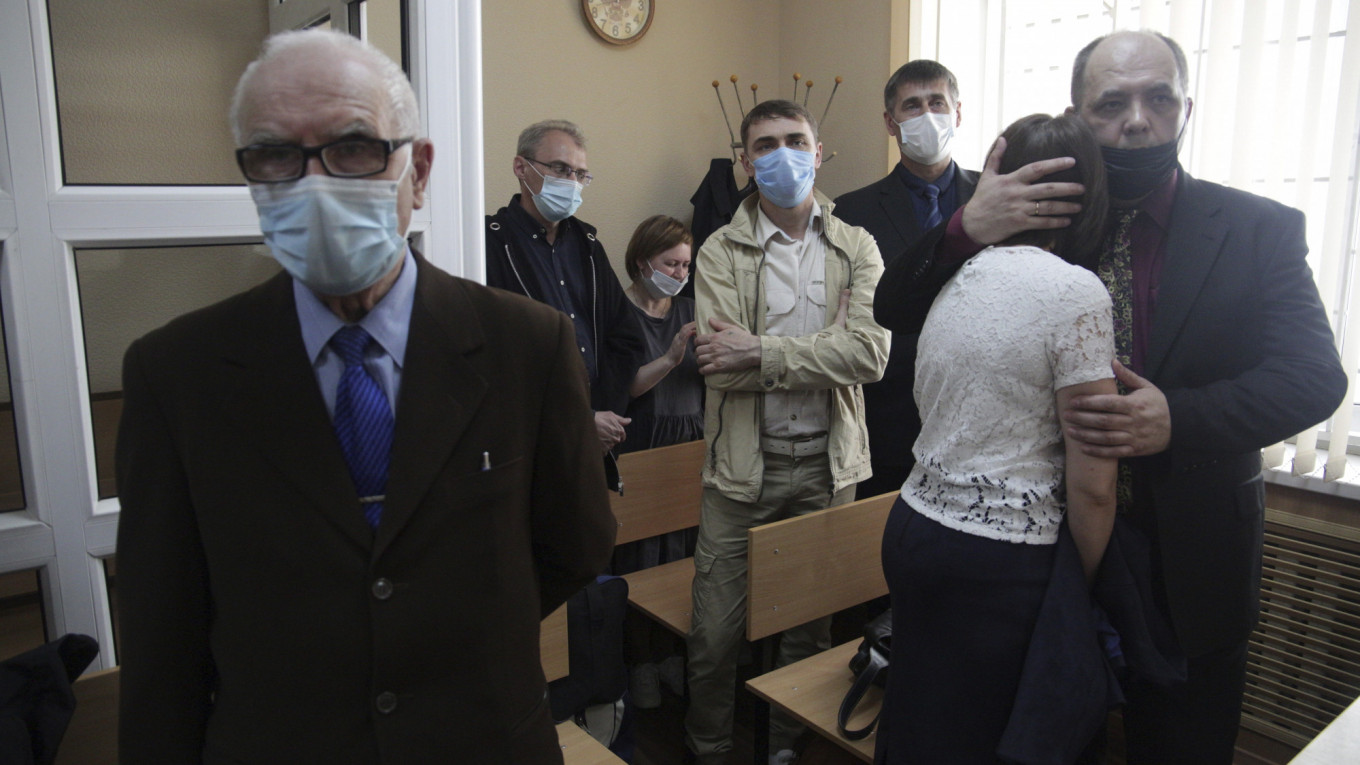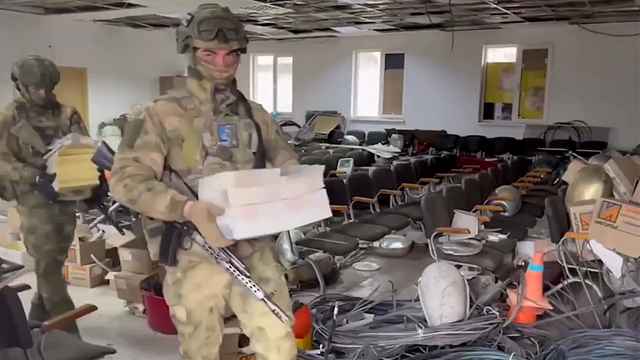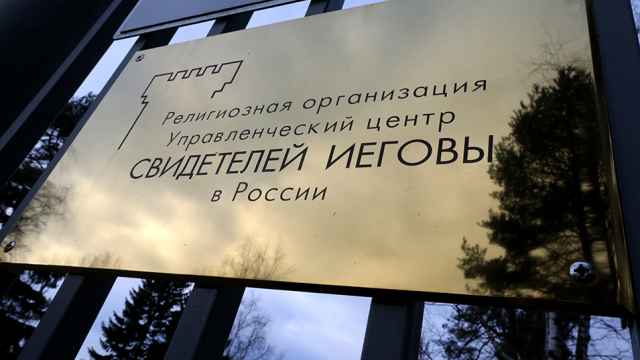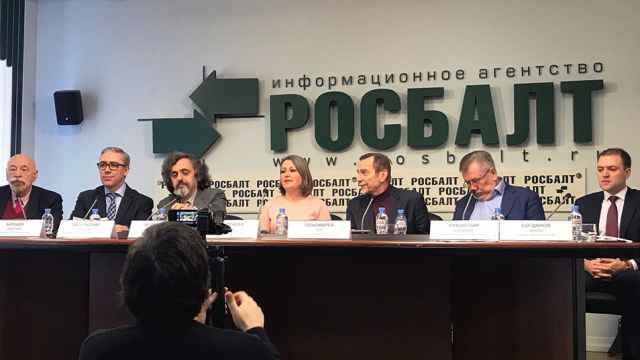Every day at 6 a.m., former Russian army officer Yevgeny sits bolt upright in bed, remembering security officers in black balaclavas storming his apartment during an early morning raid.
His was one of 16 Moscow households targeted by the authorities earlier this year for being Jehovah’s Witnesses, a Christian denomination outlawed in Russia since 2017, when the Supreme Court labeled it an extremist organization on par with jailed Kremlin critic Alexei Navalny’s Anti-Corruption Foundation.
“Afterwards, 25 people were brought to the Investigative Committee for questioning. It was painful to see anxiety and fear causing pain for these very gentle and unprotected people,” Yevgeny, who asked for his surname to be withheld, told The Moscow Times.
Jehovah’s Witnesses, who first emerged in the late 1870s in the United States, were registered as a legal entity in the Russian Empire in 1913. They are known for their door-to-door preaching, alternative interpretation of the Bible and rejection of blood transfusions. But it was their refusal to do military service that attracted the attention of the Soviet state and led thousand of them to be exiled to Siberia for anti-communist activities.
Since the extremist designation in 2017, 57 followers are currently in prison, 28 have been sentenced to a prison term and 37 remain under house arrest, according to the Jehovah’s Witnesses in Russia website.
The length of the prison sentences ranges from one to 11 years. In the most recent case last week, six Jehovah’s Witnesses were sentenced to various terms, the longest being six years.
The European Association of Jehovah’s Witnesses estimates that between 5,000 to 10,000 of its members have fled Russia since the ban came into force.
In its 2017 ruling, the Supreme Court said that Jehovah’s Witnesses’ activities showed “the signs of being extremist in nature, entailing violation of human and civil rights and freedoms, public order, and public safety.”
Extremist activity includes “propaganda of the exclusivity, superiority or inferiority of a person on the basis of his social, racial, national, religious or linguistic affiliation or attitude to religion” according to the language in the 2017 ruling.
“Thousands and thousands of Russian followers have emigrated since the 2017 ruling because the risk of being jailed for their beliefs became real,” Yaroslav Sivulsky of the European Association of Jehovah’s Witnesses in Brussels, told The Moscow Times.
Jehovah’s Witnesses are also banned from worshipping in China, Vietnam and several other Muslim countires.
Yevgeny, however, plans to stay in Russia and continue practicing his religion despite the crackdown.
“I no longer feel safe in my own home, but I would regard stopping believing in God and practicing my religion as apostasy or betrayal,” he said.
Eternal questions
When asked why he decided to become a Jehovah’s Witness, Yevgeny said his experiences in the military lead him to seek answers to the “eternal” questions.
“When I was in the army, I had several incidents that made me think about who is in charge of world events on Earth,” he said,
Yevegeny left the military in 1992, a year after the collapse of the Soviet Union, as the whole nation was seeking a new identity.
He found his answers in the Bible.
In 1994, he married a young woman who came from four generations of Jehovah’s Witnesses. His in-laws had been exiled to Siberia from Moldova in 1951 as part of Operation North, the largest Stalin-era deportation of believers from one religion of the Soviet period.
Jehovah’s Witnesses refusal to take up arms and serve in the military has led the Soviet state to prosecute the followers of the religious denomination for anti-communist activities by exiling thousands to Siberia.
Yevgeny and other Jehovah’s Witnesses were followed for years before the February raid this year according to court documents shared with The Moscow Times.
Since the raid on his apartment, Yevgeny has been questioned four more times, and has always left his home with a packed bag because he doesn’t know if he’ll return.
Yevgeny’s friend Yury Temirbulatov, 44, has been held in custody since February awaiting trial in August.
“We are now preparing a constitutional complaint to appeal the extension of the detention term, since my client was diagnosed with a serious illness and might have kidney cancer,” Temirbulatov’s lawyer, Arthur Leontiev, told the Moscow Times.
“Yury understands that he was imprisoned because of his beliefs, not because he did something wrong, '' Leontiev said.
The lawyer said that the application of the extremist law on Jehovah’s Witnesses is complicated, as most followers being persecuted today were not registered with the legal entity that was banned in 2017, and article 28 of the Russian Constitution grants freedom to practice religious beliefs.
“If logic is applied the Supreme Court would have to rule that in addition to the legal entity’s liquidation and to prohibit the activities of groups of witnesses in general, it prohibits this belief which it deems unconstitutional,” Leontiev said.
True religion
The law on extremism in Russia has evolved over the past few years to target those the state views as threats.
“Russia changed the law in such a way that it means when some experts prove that a certain statement is, in their opinion, extremist and the court agrees with this, then criminal responsibility ensues,” Sivulsky said.
That has made it possible for a believer who considers their religion to be the only true one to be designated an extremist.
“A person can be sent to prison for the fact that he considers his religion to be the only correct one, but what religion does not consider itself the only true one?” Sivulsky said.
Yevgeny struggles to understand why the Russian state views him as a threat.
“Jehovah's Witnesses have never interfered in government affairs, either as revolutionaries or as rebels. We respect authority,” Yevgeny said.
“It is upsetting to realize that 100 years of history has taught nothing to people who care for the integrity of the state.”
A Message from The Moscow Times:
Dear readers,
We are facing unprecedented challenges. Russia's Prosecutor General's Office has designated The Moscow Times as an "undesirable" organization, criminalizing our work and putting our staff at risk of prosecution. This follows our earlier unjust labeling as a "foreign agent."
These actions are direct attempts to silence independent journalism in Russia. The authorities claim our work "discredits the decisions of the Russian leadership." We see things differently: we strive to provide accurate, unbiased reporting on Russia.
We, the journalists of The Moscow Times, refuse to be silenced. But to continue our work, we need your help.
Your support, no matter how small, makes a world of difference. If you can, please support us monthly starting from just $2. It's quick to set up, and every contribution makes a significant impact.
By supporting The Moscow Times, you're defending open, independent journalism in the face of repression. Thank you for standing with us.
Remind me later.







